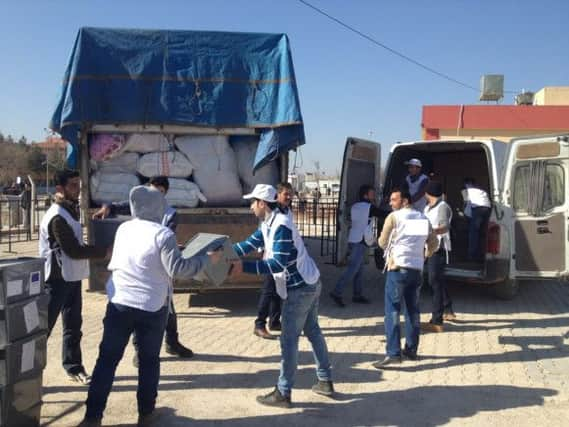The horrors of Syria experienced first hand: south Warwickshire aid worker shares his experiences


And although the Leamington-born experienced aid worker - currently working as a project manager responsible for distributing non-food aid items in a remote area near to the Syrian-Turkish border - is due to complete his project in June this year, he thinks he is likely to stay there for the next two to three years.
Having recently worked for six months in South Sudan, Simon was surprised by just how shocked he was by the situation in Syria.
Advertisement
Hide AdAdvertisement
Hide AdThe former Emscote Primary and Warwick School pupil said: “It’s like nothing I have experienced before in terms of the scope and scale of the humanitarian crisis. Even in the small town in which I work there are a hundred thousand people with the most urgent humanitarian needs.


“My first impression was one of all consuming fear and self-doubt. But then I hope it always will be - it stops complacency and keeps you focused on the objectives.”
Working in a very poor town and having arrived in the depths of winter was particularly difficult. Simon, who is also in charge of coordinating logistical and financial support for aid operations, said: “It still hits minus temperatures at night so this is a desperate situation for those forced to sleep outside.
“You have in essence millions of people who have been stripped of everything we take for granted; shelter, food water, clothing, items with which to clean themselves - everything.
Advertisement
Hide AdAdvertisement
Hide Ad“Many are then dealing with physical or mental disability, pregnancy or very young children, illness or trauma. Add to that the fact that many will have witnessed first-hand the violent death of loved ones, or simply do not know whether they are alive or dead.”
He added: “The sheer enormity and chaos of the situation and the scope of the response have shocked me deeply.
“One thing that has shocked me more than anything though is the resilience and strength of the Syrians I work with day-to-day.”
In spite of the horrors he is witnessing and the sacrifices of having to spend so much time away from his girlfriend and family, Simon - who chose to work in Syria - feels that the work he is doing is very rewarding.
Advertisement
Hide AdAdvertisement
Hide AdHe said: “The Syrian response represents the most devastating humanitarian crisis I will likely ever be involved in and, as with all aid workers, I want to work in the context where I feel I am able to have the greatest impact.
“Everyone likes to go to bed at night feeling that they have achieved something that day or overcome seemingly impossible challenges.”
But Simon, who has two sisters and two nieces and a nephew - who he “misses terribly”, admits that his choices have been emotionally straining on his family back in south Warwickshire. He said: “My mum will always imagine the worst. One time when I was in South Sudan she got a wrong number and was immediately convinced that I had been kidnapped.
“She does a very good job of hiding much of her anxiety from me as she knows it hurts to see. My dad is also worried, but as he quite rightly points out I was in more danger living in London for eight years than I am here.”
Advertisement
Hide AdAdvertisement
Hide AdWhen asked what he would most like people back at home to take from his experiences, Simon said: “Please do not forget about the Syrian crisis. This situation will only be resolved through reaching a political settlement, so constant pressure needs to be applied to those with the power to bring the right people around the negotiation table.
“For this to happen people need to stay informed. It is still the most devastating humanitarian disaster since the Cold War and will remain so until the international community can broker its resolution.”